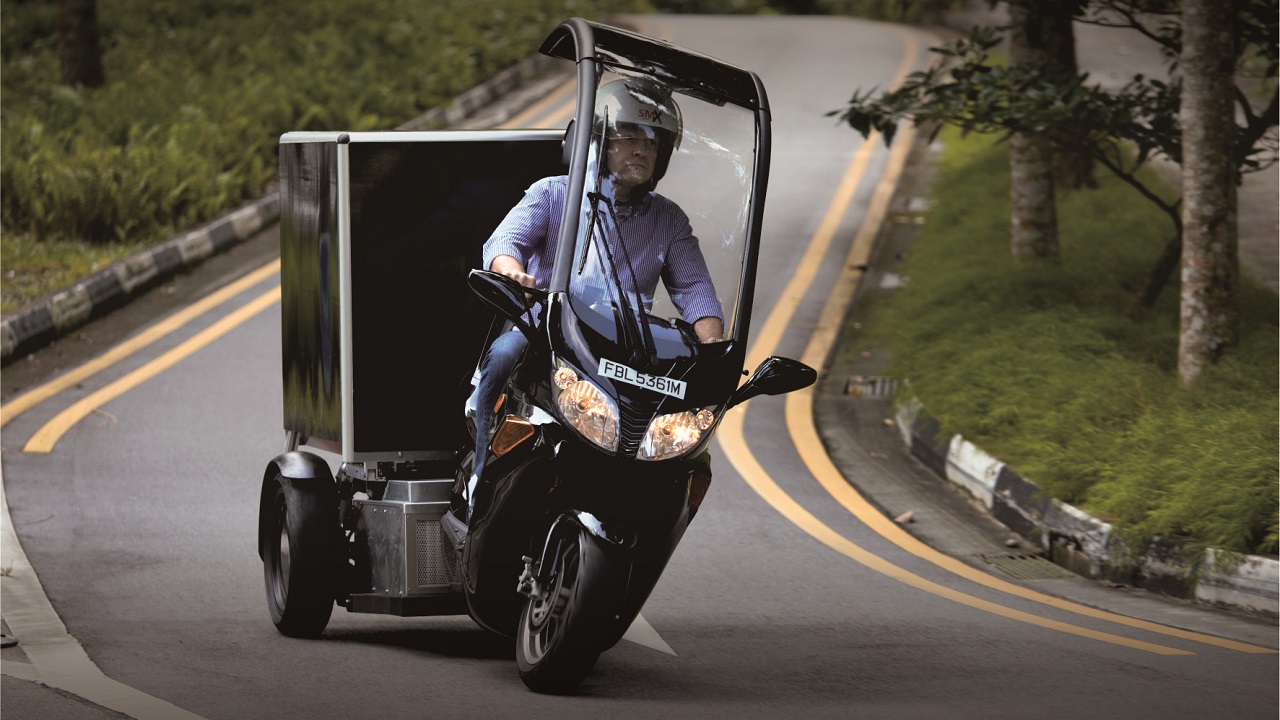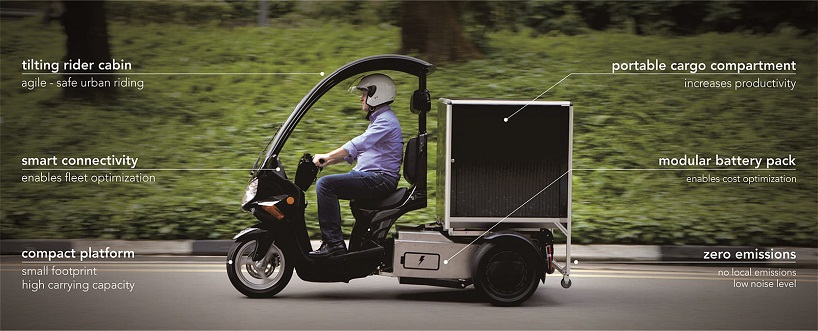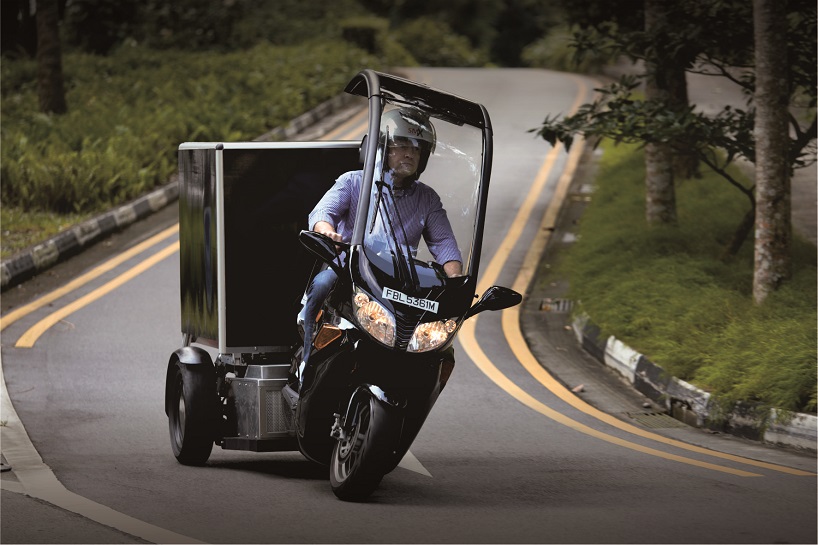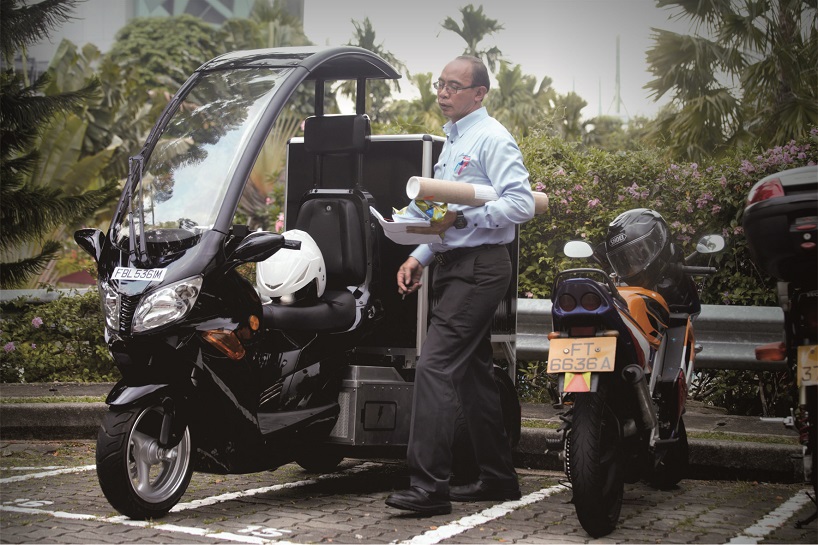- QUASAR
- AquaCycle
- Proteins4Singapore
- Singapore's Pathway to Carbon Neutrality
- CellFACE
- LightSPAN
- Computational Modelling Group
- Energy and Power Systems Group
- SITEM - Singapore Integrated Transport and Energy Model
- Past Projects
News

TUMCREATE’s electric scooter for cargo delivery, LEO, bags eMove360° Award 2017
16.10.2017MUNICH, 16 October 2017 – TUMCREATE’s electric scooter for cargo delivery, known as LEO, won the eMove360° award 2017 in the ‘Electric Vehicles’ category.
The international award was presented in six categories: Mobility Concepts & Software, Energy Storage, Charging Infrastructure, Powertrain, Automated Driving, and Electric Vehicles. LEO was hailed a winner alongside Robert Bosch GmbH, Rolls Royce and Daimler AG who received awards in other categories.
TUMCREATE’s interdisciplinary team of engineers and designers has jointly developed and built a unique 3-wheeled electric scooter for cargo handling and delivery operations in megacities. This work was done in collaboration with Singapore Post Ltd. (SingPost), the Singaporean postal services and ecommerce logistics provider.
With the increase of e-commerce, the postal volume for delivery has been consistently increasing. Catering to this growth, the delivery vehicles have to upgrade their carrying capacity as there has been a significant rise in the fleet mileage and hence the impact of these delivery vehicles on urban congestion and pollution is a growing concern. On the other hand, higher postal volume and increasing complexity of delivery logistics have led to inefficient and arduous warehouse operations.

Considering these challenges, LEO was designed with the following features:
- Portable cargo compartment for improved cargo handling
- Modular battery system enabling cost optimisation for the vehicle fleet
- Compact vehicle-platform for fast-agile and emission free urban utility
- Smart connectivity for increasing resource efficiency
1. Portable cargo compartment
Currently, a micro transportation gap exists within cargo handling operations. The cargo arrives in warehouses, where it is stored and processed. This cargo needs to be transported to the vehicles which ultimately deliver it. This micro transport from the warehouse to the vehicle can be highly time, effort and finance consuming depending on the type of cargo handled.

The portable cargo compartment designed for LEO can be detached and attached within seconds on press of a button and can be rolled inside the building where cargo is directly sorted into this compartment. For SingPost this solution improves their workflow saving 40 minutes of time and effort per post officer per day.

2. Modular battery system
The battery is the most expensive and a considerably heavy component in an electric vehicle. Postal services have very predictable operations. They have fixed delivery zones and driving distances, hence a single battery pack designed for the maximum distance would be underutilised in many cases adding unnecessary cost and weight. Hence, a modular battery pack is a solution enabling cost optimisation over the entire vehicle fleet. A fleet manager can configure the vehicles to have a range of either 35 km or 70 km without compromising on vehicle performance.
3. Compact vehicle-platform for urban utility
Urban delivery vehicles should be agile. They need to travel quickly through traffic and narrow streets while carrying high payloads and volumes for making deliveries on time. The current market offers several cargo scooters which may be agile but are not suitable for high payloads and volumes. The 4-wheelers on the other hand can carry heavy cargo and big volumes but get affected by urban congestion and have difficulties finding parking spaces. LEO addresses this issue with a compact 3-wheel platform with a footprint fitting within a standard 2-wheeler parking lot. It features a tilting rider cabin and has a cargo carrying capacity of 600 litres - 120 kg payload. The tilting rider cabin is independent of the cargo compartment which always stays upright. This makes it very comfortable, safe and intuitive for the rider to weave through traffic while carrying heavy cargo at the rear. With its electric powertrain, LEO is locally emission-free and quiet.

4. Smart connectivity
The instrument cluster developed for LEO integrates useful functions into its dashboard like fleet monitoring, real-time parcel tracking, GPS routing and real-time camera recording. This enables the fleet manager to optimise delivery operations using dynamic routing, instant push notifications and vehicle tracking.

LEO fills a gap in the current transportation system for cargo delivery and anticipates the future needs of this service regarding efficiency, environmental and social impacts. Field trials were conducted successfully together with SingPost in March 2017 as a first step toward implementation and concept validation, where LEO was used in the ‘real world’ for routine delivery operations in Singapore for two weeks. LEO received a very positive feedback from its primary users, the post officers. Furthermore, it maximises operational comfort for the post officers with its innovative features and helps escalate the acceptance of this routine job, thus producing a significant social impact.
Prof. Ulf Schlichtmann, Professor at the Technical University of Munich (TUM) and TUMCREATE Programme Director, said: “We congratulate the research team involved in the development of LEO. Clinching this award shows what can be accomplished with a strong research background based on innovative German Engineering coupled with Singapore as a perfect test bed for fresh concepts. Smart mobility is an important part of our future. The dedicated TUMCREATE team has demonstrated again that it is committed to play a key role in keeping Singapore at the forefront of urban mobility.”
Dr. Thomas Aulig, Corporate Director of TUMCREATE, said: “LEO’s development period of 12 months was directly supported by TUMCREATE Chief Executive Officer Prof. Maria-Elisabeth Michel-Beyerle and the management team. The customised vehicle increases living quality through the reduction of carbon dioxide and noise emissions in residential zones.”
About eMove360° Award
The future of the mobility is electric, connected and autonomous – it belongs to Mobility 4.0. According to surveys the market potential of the “New MobilitY” is estimated to grow up to 115 Billion Euro until 2020 – which is four times as much compared to its current level.
We extensively reflect this development with eMove360° Europe 2018 – International Trade Fair for Mobility 4.0 – electric – connected – autonomous. Under this forward-thinking umbrella brand name we have united our trade fair topics Electric Mobility, Connected & Autonomous Driving as well as Materials & Design and thus created a central platform for the Mobility 4.0.
It is our approach to not only present innovations in this field at the exhibition, but to reward them in international competition. We have therefore launched – along with the new structure of our trade fair – an award, that unites Electric Mobility and Connected & Autonomous Driving: the eMove360° Award for Electric Mobility & Autonomous Driving! With this award, that evaluates products and services according to criteria like scientific-technological performance, sustainability as well as feasibility or economic efficiency, we bring together the two big future issues of the automotive industry in one competition. For more information, visit www.emove360.com/emove360-award-2018/
About TUMCREATE
TUMCREATE is a research platform for the improvement of Singapore’s public transportation, including the deployment of electric and autonomous mobility. Researchers from the Technical University of Munich (TUM) and Nanyang Technological University (NTU) join forces and are supported by the National Research Foundation (NRF) as part of the Campus for Research Excellence and Technological Enterprise (CREATE). TUMCREATE is made up of over 100 scientists, researchers and engineers led by professors from TUM and NTU. For more information, visit www.tum-create.edu.sg.
CREATE is an international collaboratory housing research centres set up by top universities. At CREATE, researchers from diverse disciplines and backgrounds work closely together to perform cutting-edge research in strategic areas of interest, for translation into practical applications leading to positive economic and societal outcomes for Singapore. The interdisciplinary research centres at CREATE focus on four areas of interdisciplinary thematic areas of research, namely human systems, energy systems, environmental systems and urban systems. More information on the CREATE programme can be obtained from www.create.edu.sg.
Contact:
Corporate Communications TUMCREATE
1 CREATE Way
#10-02 CREATE Tower
Singapore 138602Media and Communications
communications@tum-create.edu.sg

